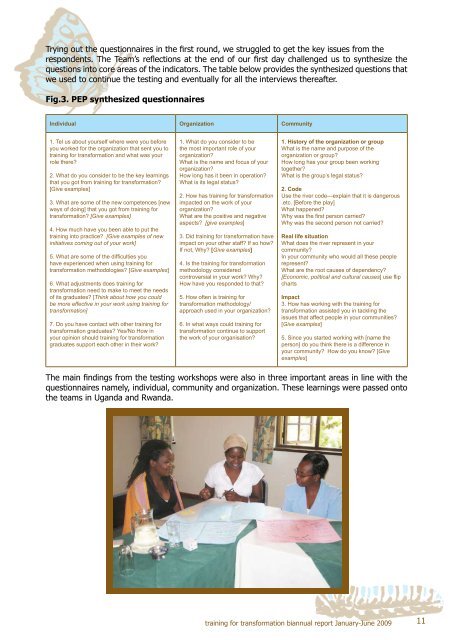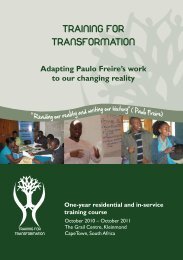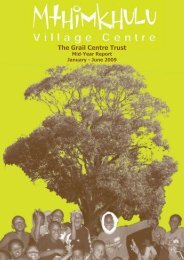Training Transformation - The Grail Centre
Training Transformation - The Grail Centre
Training Transformation - The Grail Centre
- No tags were found...
Create successful ePaper yourself
Turn your PDF publications into a flip-book with our unique Google optimized e-Paper software.
Trying out the questionnaires in the first round, we struggled to get the key issues from therespondents. <strong>The</strong> Team’s reflections at the end of our first day challenged us to synthesize thequestions into core areas of the indicators. <strong>The</strong> table below provides the synthesized questions thatwe used to continue the testing and eventually for all the interviews thereafter.Fig.3. PEP synthesized questionnairesIndividual Organization Community1. Tel us about yourself where were you beforeyou worked for the organization that sent you totraining for transformation and what was yourrole there?2. What do you consider to be the key learningsthat you got from training for transformation?[Give examples]3. What are some of the new competences [newways of doing] that you got from training fortransformation? [Give examples]4. How much have you been able to put thetraining into practice? [Give examples of newinitiatives coming out of your work]5. What are some of the difficulties youhave experienced when using training fortransformation methodologies? [Give examples]6. What adjustments does training fortransformation need to make to meet the needsof its graduates? [Think about how you couldbe more effective in your work using training fortransformation]7. Do you have contact with other training fortransformation graduates? Yes/No How inyour opinion should training for transformationgraduates support each other in their work?1. What do you consider to bethe most important role of yourorganization?What is the name and focus of yourorganization?How long has it been in operation?What is its legal status?2. How has training for transformationimpacted on the work of yourorganization?What are the positive and negativeaspects? [give examples]3. Did training for transformation haveimpact on your other staff? If so how?If not, Why? [Give examples]4. Is the training for transformationmethodology consideredcontroversial in your work? Why?How have you responded to that?5. How often is training fortransformation methodology/approach used in your organization?6. In what ways could training fortransformation continue to supportthe work of your organisation?1. History of the organization or groupWhat is the name and purpose of theorganization or group?How long has your group been workingtogether?What is the group’s legal status?2. CodeUse the river code---explain that it is dangerous.etc. [Before the play]What happened?Why was the first person carried?Why was the second person not carried?Real life situationWhat does the river represent in yourcommunity?In your community who would all these peoplerepresent?What are the root causes of dependency?[Economic, political and cultural causes] use flipchartsImpact3. How has working with the training fortransformation assisted you in tackling theissues that affect people in your communities?[Give examples]5. Since you started working with [name theperson] do you think there is a difference inyour community? How do you know? [Giveexamples]<strong>The</strong> main findings from the testing workshops were also in three important areas in line with thequestionnaires namely, individual, community and organization. <strong>The</strong>se learnings were passed ontothe teams in Uganda and Rwanda.training for transformation biannual report January-June 2009 11




